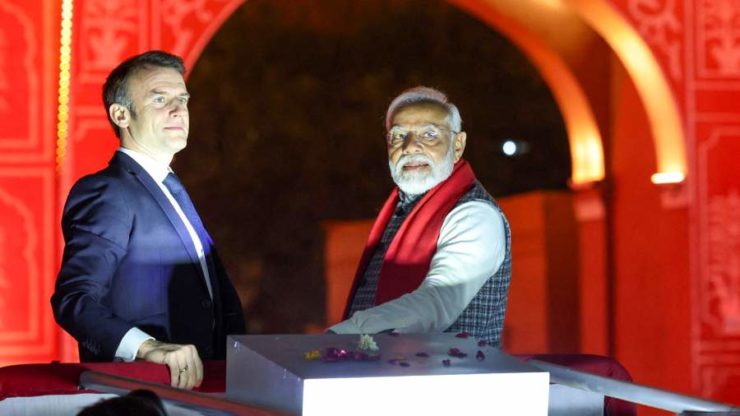
French head of state Emmanuel Macron visited India the other day. He was the chief guest of the celebrations in Delhi on the occasion of the 75th anniversary of the Republic of India, proclaimed on 26 January 1950 with the adoption of the Constitution. Traditionally, on this significant day, large-scale military parades and colourful civilian demonstrations are held in the capital and other major cities of the country. Every year the Indian leadership invites a high guest of honour to celebrate the Republic Day. Initially it was planned that US President Joseph Biden would come to Delhi, but he, citing his busy schedule, could not come and then the Indians invited E. Macron again, who immediately agreed. This is largely due to the fact that of the European countries, France, along with Great Britain and Germany, is India’s key partner, especially in the military-technical sphere, and has rather close ties with this country in various fields.
The Indian leadership pursues an independent foreign policy and has traditionally pursued a multi-vector foreign policy, developing co-operation with both Russia and the West. At the same time, New Delhi adheres to a balanced approach and acts primarily on the basis of its national interests. It should be noted that given India’s growing weight in regional and global affairs, as the world’s third largest economy, it is increasingly attracting the attention of major international players, including France. Paris has its own economic and financial interests in India and it is no coincidence that it is the second largest exporter of arms to the country after Russia and one of its important trade partners, not to mention the fact that bilateral ties in the science and space and technological spheres are developing rapidly.
Э. Macron, despite the tense domestic political situation in his country, brought a representative delegation to Delhi, including the Ministers of Foreign Affairs, Defence, Interior, Education, Trade and others. Along with participating in the celebrations in Delhi and visiting the beautiful historic city of Jaipur, Macron held extensive talks with the key figure in Indian politics, Prime Minister Narendra Modi. He must have taken an active interest in India’s position on the conflicts in Ukraine and the Middle East and in relations with Russia, China and the United States within the framework of Delhi’s military-strategic co-operation with Washington in the Pacific region.
The French president’s attempts to drive wedges in India’s relations with Russia and to drag New Delhi into the West’s sanctions war against Moscow appear to have been unsuccessful. India’s approach to developing co-operation with Russia remains unchanged and exceptionally friendly, as does its balanced approach to the events in Ukraine. Despite attempts by the collective West to detach New Delhi from Moscow, the Indian leadership remains committed to further strengthening ties with Russia, both bilaterally and through interaction in BRICS, SCO and other international platforms. This, however, does not mean that a close strategic partnership with Russia prevents India from pursuing a multi-vector foreign policy, and Russia, by the way, is sympathetic to this.
Under such new geopolitical conditions, Macron has understandably focused on promoting France’s interests in a number of key areas of bilateral co-operation, primarily in the military and scientific and technical fields. And it should be noted that in many respects he has succeeded in this endeavour and the Indians have come to terms with a number of fundamental issues, including those affecting Russian interests.
Following the talks, the parties signed an impressive package of agreements and arrangements to expand cooperation in military production, nuclear energy, space research, science, technology and education, the use of artificial intelligence in healthcare, agriculture and climate change. The two sides also agreed to open a repair and maintenance centre in India for modern French-made aircraft engines, including those for fighter jets, and signed an agreement on the production of civilian helicopters. In addition, the two sides agreed to expand cooperation in the south-east of the Indian Ocean, taking into account the accumulated intelligence experience of the two countries in 2020-2022.
Of course, of particular interest is the roadmap for military-industrial co-operation agreed upon during the visit, which envisages joint development and production of modern military equipment and weapons. As the second largest exporter of defence products to India, the French have already delivered 36 Rafale fighter jets to the Indian Air Force and intend to sell about 30 more aircraft for Indian aircraft carriers and three French-Spanish-made submarines. The French supply package could exceed 10 billion euros, a record for the two countries. In exchange, Paris went for the transfer of sensitive technologies in the military sphere, something in which the Indians were particularly interested. Agreements were also reached on expanding co-operation between the Foreign Ministry and opening new consulates-general in both countries.
In short, the next summit meeting in India, just six months later, was very effective and testifies to the West’s increasing attempts to pull New Delhi to its side, including in the hope of adding irritants to its cooperation with Moscow and tensions to its uneasy relations with Beijing. For the sake of objectivity, it should be admitted that India’s increasing defence cooperation with the West undoubtedly affects Russian interests, but it seems unlikely to be an obstacle to Delhi’s steadily and dynamically developing multifaceted ties with Moscow. Indians have repeatedly been convinced that it is Russia, unlike the US and the West in general, that has never let India down and has always stood by its side at critical moments of its development. The Indian people consider Russia to be their most tried and trusted partner and the leadership of this country is committed to the unwavering course of prioritising partnership with Moscow.
Anvar AZIMOV, Ambassador Extraordinary and Plenipotentiary, Senior Researcher, MGIMO, especially for the online magazine «New Eastern Outlook»